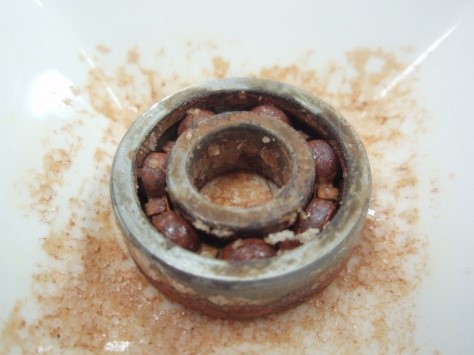|
We exclusively use pure plastics and none that come from recycling. |
For use in water and underwater environments (water-resistant):
Plastic bearings can be safely used in environments where moisture occurs irregularly, as well as in water, seawater, and steam, without the risk of corrosion and rust. In environments where normal metal bearings cannot be used or are difficult to install, the use of our plastic bearings can significantly extend the lifespan/maintenance intervals of your equipment.
The following image actually depicts a 24-hour exposure of saltwater on a metal bearing and plastic bearing to document the subsequent changes.
●Condition after 24 hours of soaking in saltwater.
Plastic bearings can also excel in very harsh environments due to their properties.
Since plastics are inherently self-lubricating, plastic bearings can be used without lubricants. Therefore, even in humid environments, liquids, or steam, there is no risk of contaminating the surroundings with lubricants.
Plastic bearings made of PEEK are particularly suitable in environments with high heat generation and steam. When used in seawater or liquids with impurities, fully spherical bearings (without cages) are also suitable as they are less prone to reacting to contaminants.
Guidelines for Material Selection Based on Application:
Recommendation Levels:
☆Highly Recommended ◎Recommended ○ Satisfactory
Price Class
EX Exclusive A High-end B Average C Budget-friendly D Economical
| Application | Recommendation Level | Material | Price Class |
| Water/Seawater | ☆ | PTFE (PT) | A |
| ☆ | PEEK (PK) | A | |
| ☆ | PPS (PS) | B | |
| ☆ | Phenol (SD) | C | |
| ☆ | UHMW (PE) | D |



